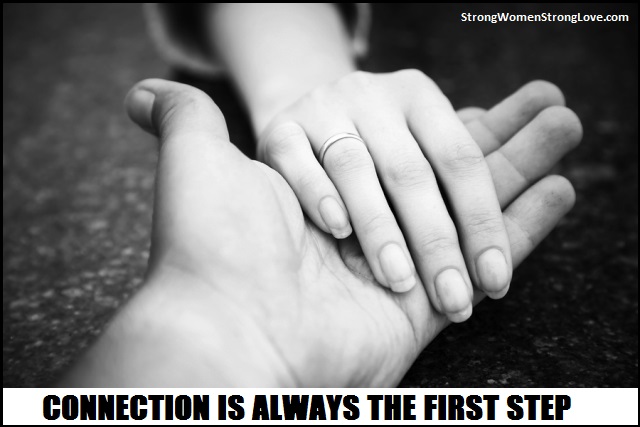by Strong Women Strong Love | Jan 2, 2017 | Personal Power, Principal Priorities |

Is this the marriage you wanted? I know that’s a blunt question. But take a moment to be really honest with yourself.
If your relationship isn’t what you want it to be, what are you doing about it?
Because there are things you can do.
It’s easy to buy into the common idea that if your partner were your true soul mate, he would instinctively fill all of your needs. That simple expectation can set your relationship up for trouble by putting you into a passive role in your marriage.
The reality is that you have some ability to shape your marriage. As I’ve said before, there is no neutral in a relationship. You’re either building up your marriage or tearing it down. Take an active role in your relationship to help it grow into one that meets your needs.
Even if your marriage does feel perfect right now, don’t assume it doesn’t need daily maintenance. Marriages can change for the better or for the worse depending on your everyday actions.
Here are just a few ideas for actively getting — or keeping — your marriage on track. You can find many more in my book Strong Women, Strong Love.
- Take care of yourself first. If you’re trying to work on your relationship while you feel personally depleted, you’re not going to get too far. When you’re perpetually tired and stressed, you lose some key relationship skills, like patience and being a good listener. Take a few extra self-care steps this week, whether that means catching some extra sleep or making time for things that bring you joy. You’ll feel better and your relationship will benefit.
- Make marriage maintenance a daily habit. You don’t need a whole different life (you know, one with more time, money or distance from your in-laws) to have a better marriage. Instead, remember that you can improve your relationship just by being a little more mindful in moments you share every day. Put away your phones when you talk. Remember to say thank-you. Add more affectionate touch. And make sure conflict always stays in the respectful zone.
- Create a marriage-friendly lifestyle. You’re probably juggling lots of different priorities — and all of them feel urgent. Your relationship can get lost in the shuffle. Take a look at how you spend your time. Are there activities or obligations you can let go of in order to devote more time to you marriage and other things that really matter?
Your marriage is always a work in progress. What small steps can you take this week to move it closer to where you want it to be?
by Strong Women Strong Love | Dec 14, 2016 | Personal Power, Principal Priorities |

Are you looking for a New Year’s resolution? I have a powerful one for you.
All it involves is saying a single two-letter word. It’s simple, but it’s not easy. At least not at first. Here it is:
Say NO. A lot.
The very idea of making “no” a bigger part of your vocabulary might unsettle you. I’ve seen that many women tend to feel very uncomfortable around this one little word. For some of us, saying no feels almost like an act of aggression.
Here’s the thing, though. None of us — no matter how capable and generous we are — can say yes all the time. Every time you say yes to one thing, you’re saying no to something else at the same time. Yes and no are like flip sides of the same coin.
So you have to get very deliberate. What are the important things in your life that you always want to say yes to? Maybe it’s having weekends free for your family, or enough time for the yoga classes that make your body and spirit strong. When you know what your yeses are, it gets easier to say no to other things.
It’s wise to start small when you’re learning to say no. You don’t have to leap right into a face-to-face announcement to your mom that you’re not spending Christmas Day at her house like you usually do. Pick a request that’s a little less emotionally loaded first — like turning down a telemarketer that wants just a few minutes of your time to make a pitch (“Thank you so much, but I’m not interested. Goodbye.”) And give yourself permission to take the easy way out. Say no by text. Or just don’t speak up first at a meeting when volunteers are being recruited.
Even then, you might feel guilty about saying no.This doesn’t mean you’re a bad person. Sometimes guilt is helpful, but sometimes it’s just a sign that part of you is uncomfortable and resisting change.If you can, just keep taking small steps, and you will find this kind of guilt tends to dissolve over time.
Saying no more frequently eventually opens up a sense of freedom. You can free yourself from time-wasting, meaningless activities, and use your time to do what you love with the people you love. You can free up space to take better care of yourself, whether that means sleeping and exercising more or delving back into a long-neglected hobby.
“No” might not feel natural for you at first. But it’s an essential word to master. So what will you say no to in 2017?
by Strong Women Strong Love | Dec 1, 2016 | Personal Power |

I’ll be upfront with you: One of the best gifts you can give yourself and your husband this time of year is being direct.
Kind directness keeps the lines of communication open in your marriage. It keeps resentments from taking root. It helps make sure you’re both operating from the same set of expectations.
Yet being direct is hard for many women. Why is that? Why are we so uncomfortable asking for what we need or telling others what’s going on with us?
A lot of it has to do with how women have been raised in our culture. You may have been taught to anticipate everyone else’s needs — your husband’s, your kids’, your boss’s. And I bet you’re very good at it. You probably know the subtle signs that your husband is ready to leave a party, or that your daughter could use some extra encouragement before her semester exams.
Because we’re so adept at reading others and knowing what they need, I think we feel a little disappointed when we have to come out and say the things that we think others, especially our husbands, should have figured out on their own. I’ve heard a version of this sentiment from women many times: “I don’t want to have to tell him. He should just know.” It’s as if getting what they want has less value if their husbands don’t intuit it.
Some of us have also been taught that it’s somehow rude to communicate directly. Maybe, for example, you’ve gone on at length about how busy you are at work in hopes that your husband will offer to take on more gift shopping or holiday travel prep. Dropping hints might work with other people who are fluent in indirect communication. But it may just go right over your husband’s head.
Wouldn’t it be easier just to ask? Most husbands relish the chance to make their wives happy. And they’d appreciate more information on how to do that. He doesn’t care about you any less just because you have to come right out and tell him the gifts you’d like or that you’d rather stay home more this holiday season instead of traveling. In fact, he’d be thrilled to know.
This holiday season, look for opportunities to be more direct. See how it feels and how others react. If you’re still a little uncomfortable, that’s OK. You’re learning something new. Keep practicing. It really does get easier.
by Strong Women Strong Love | Nov 16, 2016 | Persistent Pressures, Personal Power |

This time of year, you’ll see plenty of articles about how to have the happiest holiday season ever. You’ll find no shortage of advice on how to deck your halls, craft handmade gifts, start beloved traditions and dazzle at parties.
That’s all well and good, but I want to make things much simpler for you. Today I’m going to share with you one tip that could make this the least stressful holiday season you’ve ever had. It’s free. It doesn’t require crafting or cooking skills. It works no matter which holidays you observe. And it doesn’t have an expiration date. In fact, I hope you use it well after the last New Year’s celebrations have wrapped up.
What’s my magical tip?
When people get on your nerves, assume that they’re not doing it on purpose.
Trust me, you’ll have plenty of opportunities to try out this mental shift in the coming weeks. What if you stopped assuming things like this?
- Your husband leaves all gift shopping to you because he doesn’t value your time.
- Your friend posts pictures of her perfect decorations and gift-wrapping to make others feel inferior.
- Your brother is always late to gatherings because he’s trying to tick you off.
- Your mom only picks at the holiday meals you prepare because your cooking isn’t fancy enough for her.
The truth is, we’re all pretty self-involved. We don’t think very much about the ramifications our actions have on others. Unless a person has shown you before that he’s malicious (in which case you’ve got a whole other issue going on), it’s more likely that he just doesn’t know how he’s affecting you.
When you assume someone is being clueless instead of downright nasty, the whole situation suddenly feels a great deal lighter. You let go of resentments and start seeing constructive solutions.
Getting Past Assumptions
Since this blog focuses on how to strengthen your marriage, I would especially encourage you to stop assuming your husband has bad intentions when he does something that disappoints or irritates you.
The holiday season can be a time of high expectations, so it’s prime time for assuming the worst!
Let’s go back to an example from above:
Your husband leaves all gift shopping to you.
You’ve been assuming you know the reason for this behavior. You’re absolutely certain that it’s because he doesn’t value your time, so he’s intentionally passing the gift shopping off to you.
But what else could be behind his behavior?
- Maybe he thinks you love gift shopping.
- Maybe he believes you think he’s terrible at choosing gifts.
- Maybe his own mom did the shopping for their family and he just assumes that’s how all families do it.
- Maybe he doesn’t realize how long it takes and that it affects your schedule that much.
It’s also possible he really doesn’t value your time, but it’s important to be sure that’s the case before you work off that negative assumption.
Sometimes it’s easier to start by assuming your husband isn’t doing anything to you on purpose and just letting him know how his actions affect you. That could sound like:
With both our families growing, we’re gift shopping for more people now. Taking care of it all is leaving me pretty stressed. You’d be helping me a lot if we could start dividing up the gift list.
As an experiment this week, pay attention when your husband or anyone else pushes your buttons. Notice whether you automatically assume the worst about their behavior. If you do, try replacing that assumption with the belief that the other person isn’t trying to hurt you. How does that make you feel? Let me know how this mental shift works for you during the holiday season and beyond.
by Strong Women Strong Love | Nov 1, 2016 | Passionate Partnership, Persistent Pressures |

I’m a big fan of psychiatrist Daniel Siegel. You may remember a past blog post where I shared some of Siegel’s advice about what to do when you “flip your lid.”
Today, I want to talk about another strategy from Siegel. You may have heard of his Connect and Redirect method in the context of parenting. But the ideas behind it can strengthen your marriage (or any other relationship, for that matter).
The key thing to remember about Connect and Redirect is that any interaction will be more fruitful and satisfying if you take a moment to establish emotional connection before launching into what you need.
In our marriages, though, we often forget this step. Because we’re all so busy, it seems easier just to “cut to the chase.” We also tend to take those we’re closest to for granted and be much more abrupt and less tactful with them than we are with other people.
But taking that extra moment to build connection pays off. It helps your spouse get into the mental space where he can truly hear what you’re saying and engage with you.
Make Connection a Habit
Establishing connection doesn’t take long and it’s not complicated. Loving touch and positive eye contact go a long way. So does acknowledging what’s going on with your husband before you bring up the topic you want to discuss. You don’t have to reserve this communication technique for big, important discussions. It’s just as handy when you’re dealing with the routine concerns of family life.
Compare these two interactions:
- Your husband arrives home clearly still stressed from work or his commute. You shout from the kitchen, “The cable’s out again – what are we going to do about this?”
- Your husband arrives home looking stressed. You greet him with a quick hug and kiss and ask what’s up. He says traffic was much heavier than usual during his drive home. “Ugh! Frustrating!” you commiserate. “When you’ve had a chance to unwind a little, I want to talk to you about maybe changing cable providers.”
In the second interaction, you’re letting your husband know that he’s cared for and that he doesn’t have to put his defenses up. You’re making it easier for the two of you to work together for a solution to the cable issue.
As I said earlier, sometimes we have to be deliberate in giving our spouses the same consideration we automatically show our friends. If you know this area is a trouble spot for you, you may want to remind yourself to frame things with your husband the same way you would if you were talking with a friend. If, for example, you needed to reschedule your weekend trip with a friend, you’d probably take a minute to check in on her life and see if it’s a good time to talk before you told her about the change in plans. But you might be tempted to skip those “niceties” with your husband.
Remember, though, that we all need reminders that the people we care about care about us in return. When we get them, we show up more fully and give more generously. The time you invest in nurturing that feeling of connection is well worth it.






